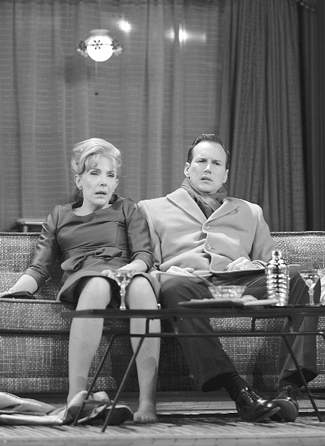Yesterday’s birthday cakes and tomorrow’s left-overs
When sex is commoditized, is love possible? Does anyone care? And is it any wonder there is such isolation and depression in the world when our means of connection is rendered meaningless? These are the questions that haunt one long after the end of “Red Light Winter,” Adam Rapp’s most mature drama to date, and a chilling, but thoroughly engrossing evening. In the first act, set in a cheap hotel in Amsterdam’s red light district, Matt, a writer, and Davis, an editor, are traveling together. Davis procures Christina, a prostitute, for Matt, but Christina in the procurement process has become smitten with Davis. Matt is a quiet, haunted, and introspective—exactly the type who would latch onto a long-standing friendship with Davis for the latter’s excesses, party attitude, and the apparent ease with which he sails through life.
In the second act, Christina arrives at Matt’s fetid East Village flat, sick, thrown out of her home, and thinking she has Davis’ address. Matt, it seems, became obsessed with Christina, while, it turns out that Davis forgot her. Davis’ ensuing cruelty drives Christina away just at the point that Matt feels he may have made a connection in reality.
What makes the play so amazing is that Rapp, who also directed beautifully, has balanced the simplicity of a love triangle with the complexity of the emotions and the larger-scale sense of a world that has spun out of control. For various reasons, there is no happy ending for any of the characters, and the unnecessary tragedies of each has an almost classic purity brought down to a paltry human scale. In that sense, the play is Chekhovian and the simple trappings of a life—a cell phone, a dress, a tape recording—speak volumes about life today.
Rapp may not be even remotely cheery, but he is honest, and even in an abstract narrative, that honesty is what resonates. Christopher Denham gives a fine performance as Matt, perfectly capturing his hope and torment. Gary Wilmes in the less developed part of Davis is no less adequate, and Lisa Joyce balances the pretense and fear of Christina with subtlety and grace.
The sets by Todd Rosenthal perfectly evoke the claustrophobic chaotic world of the play, and the lights by Keith Parham and sound design by Eric Shim help significantly to make this one of the most exciting new plays of the waning season.
Neil Simon’s plays have not aged well. With the lackluster production of “The Odd Couple” earlier this season and the new revival of “Barefoot in the Park,” Simon’s plays are starting to seem like yesterday’s birthday cake—pretty to look at, but stale and uninspiring when cut into. It’s clear that Simon was not writing for the ages, and it’s ironic because a 17th century comedy like “The Rivals” or the recent Irish Rep revival of a 19th century play “Mrs. Warren’s Profession” can still resonate with contemporary audiences. Both those plays retain their vibrancy because the author bothered to set the social, thematic, and narrative contexts so that the audience knows the journey they’re embarking on.
Simon, on the other hand, relies wholly on the experiences of his audiences to compensate for his lack of exposition based on their perceptions at the time it was written. This is disposable theater, and to treat it as anything else requires a much more capable team than have mounted the “Barefoot” revival.
For example, it’s inconceivable in 2006 an attractive, capable, educated woman would want to put herself completely under the power and control of a man to the extent Corie Bratter does in marrying the young lawyer Paul. Likewise, we have to assume that Corie’s widowed mother is leading a life largely of seclusion in New Jersey and that the crazy guy upstairs manages to float by with no visible means of support. As with “The Odd Couple,” Simon relies on his audience to fill in the blanks, and so both plays seem woefully dated.
Worse yet, Scott Elliott has directed the show as if it was a “Method” class at the Actor’s Studio. It has a leaden seriousness that takes whatever sparkle there might have been right out of the show. I guess Jerry Zaks, who would be better able to handle this kind of comedy, wasn’t available. This is a show that cries out for comic bits, but what are there are undeveloped. Who cares about the two-dimensional characters? Give us the gags. When Corie makes a bad Martini, everyone makes a face and then drinks it as if it were normal. What’s that about? Why when Paul is packing to leave can’t we have a bit with the suitcase? This is the comedy the show was written for, and a rollicking production would more than compensate for the dated material.
The actors try valiantly, for the most part. Tony Roberts, as the artistic neighbor, and Amanda Peet seem lost, and they are talented actors with wonderful comic potential. Jill Clayburgh as Corie’s mother is charming and does a funny drunk—but not funny enough. Only Patrick Wilson comes close to achieving the paper heart of the script with a rampant physicality and an inherent timing that makes even his undeveloped bits the best performance in the show.
The star of the show, however, is a vibrant green dress designed for Clayburgh by Isaac Mizrahi. His sense of period is dead on, and only Mizrahi seems to know what he’s up to in this, which is why the clothes dazzle and the rest of the evening seems so flatfooted. It didn’t have to be.
gaycitynews.com
































